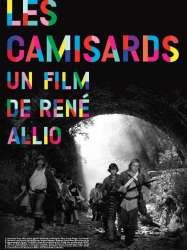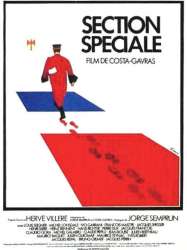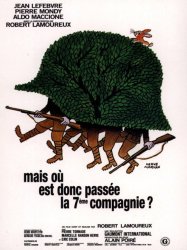Films with theme "Histoire de France", sorted by revenue

Line of Demarcation (1966)
, 2hDirected by Claude Chabrol
Origin France
Genres Drama, War, Comedy-drama, Historical
Themes Political films, Histoire de France, L'Occupation allemande en France
Actors Jean Seberg, Maurice Ronet, Daniel Gélin, Stéphane Audran, Reinhard Kolldehoff, Jacques Perrin
A small village in the Jura is split by the river Loue which creates the line of demarcation between Nazi occupied France and freedom. A French officer, Pierre (Ronet), is released by the Nazi soldiers to find his chateau converted into a German command centre. Whilst he is obliged to co-operate with the enemy, his wife Mary (Seberg) supports the resistance movement and is willing to risk her life for it. The Nazis step up their activity against the resistance, insisting that any who attempt to cross the line of demarcation will be shot. When his wife is arrested, Pierre decides to switch his allegiance. The movement is hindered by an informer and another man who pretends to help the resistance fighters but leads them to the Nazis and steals all their possessions.

War and Peace (1968)
Directed by Serge Bondartchouk
Origin Russie
Genres Drama, War, Historical, Romance
Themes Political films, Histoire de France, Napoleonic Wars films, French Revolution films
Actors Serge Bondartchouk, Lioudmila Savelieva, Viatcheslav Tikhonov, Aleksandr Borisov, Oleg Tabakov, Nonna Mordioukova
Andrei Bolkonsky In St. Petersburg of 1805, Pierre Bezukhov, the illegitimate son of a rich nobleman, is introduced to high society. His friend, Prince Andrei Bolkonsky, joins the Imperial Russian Army as aide-de-camp of General Mikhail Kutuzov in the War of the Third Coalition against Napoleon. As Pierre's father recognizes him, he attracts the attention of Hélène Kuragin and marries her, only to discover she is unfaithful to him. Bolkonsky takes part in the failed campaign in Austria, where he witnesses the Battle of Schöngrabern and the Battle of Austerlitz. The prince is badly wounded and is mistaken for dead. His wife dies at childbirth. Bolkonsky returns to his home and meets Natasha Rostova, the young daughter of a count.

Potatoes (1969)
, 1h30Directed by Claude Autant-Lara
Origin France
Genres Drama, Comedy, Comedy-drama
Themes Histoire de France, L'Occupation allemande en France, Mise en scène d'une plante
Actors Henri Virlogeux, Pascale Roberts, Jacques Balutin, Marc Eyraud, René Havard, Bernard Lajarrige
À Bourg-Fidèle, petit village des Ardennes (pendant la guerre), il est devenu de plus en plus difficile pour Clovis Parizel, ouvrier de fonderie, de nourrir sa famille. Un jour, il arrive à son dernier sac de patates. Sa femme, Mathilde, lui conseille d'aller voir les Guignard, parents d'un camarade de guerre prisonnier en Allemagne, pour leur apporter la lettre qu'il a reçue de leur fils et leur demander quelques patates. D'abord hésitant quant à cette idée, c'est sur une suggestion de son beau-frère, douanier, qui lui conseille de se les faire envoyer par chemin de fer, qu'il décide finalement de passer en zone libre. Sans laissez-passer, il est obligé de descendre du train en arrivant en zone libre mais ayant oublié son chapeau, il parvient à remonter dans le train, pendant que les Allemands lui tournent le dos.

The Sorrow and the Pity (1971)
, 4h11Directed by Marcel Ophuls
Origin France
Genres War, Documentary, Historical
Themes French war films, Films about racism, Films about religion, Documentary films about racism, Documentary films about law, Documentary films about war, Documentary films about historical events, Documentary films about religion, Political films, Films about Jews and Judaism, Documentary films about World War II, Histoire de France, L'Occupation allemande en France
Actors Christian de La Mazière, Maurice Chevalier, Marcel Ophuls, Junie Astor, Danielle Darrieux, Suzy Delair
Part One of the film, The Collapse, has an extended interview with Pierre Mendès France. He was jailed by the Vichy government on charges of desertion, but escaped from jail to join Charles de Gaulle's forces operating out of England, and later served as Prime Minister of liberated France.

Opium and the Stick (1970)
, 2h15Directed by Ahmed Rachedi
Origin Algerie
Genres Drama, War, Action
Themes French war films, La colonisation française, Algerian War films, Histoire de France
Actors Marie-Josée Nat, Rouiched, Sid Ali Kouiret, Jean-Claude Bercq, Jean-Louis Trintignant, Mahieddine Bachtarzi
Dans un village de montagne en Kabylie, pendant la guerre d'Algérie, la majorité de la population a rallié le mouvement indépendantiste du FLN. L'armée française décide de le rayer de la carte.

The French Calvinists (1972)
, 1h40Directed by René Allio
Origin France
Genres Drama, Historical
Themes Histoire de France
Actors Rufus, Jacques Debary, Philippe Clévenot, Gérard Desarthe, Dominique Labourier, François Marthouret
Le film Les Camisards retrace l'épopée des Camisards, ces groupes de protestants cévenols (qui sont majoritairement des paysans et ouvriers de la soie) qui combattirent les dragons de Louis XIV quelques années après la révocation de l'Édit de Nantes. Le récit va de la formation de leur groupe à la suite de Gédéon Laporte, jusqu'à leur défaite à Pompignan.

Nothing to Report (1973)
, 1h50Directed by Yves Boisset
Origin France
Genres Drama, War
Themes French war films, La colonisation française, Algerian War films, Histoire de France
Actors Jacques Spiesser, Jacques Weber, Jean-François Balmer, Jacques Villeret, Claude Brosset, Michel Peyrelon
En 1956, pendant la guerre d'Algérie, March, Charpentier et Dax, des réservistes, se retrouvent dans un bataillon disciplinaire. Ils sont alors pris dans les engrenages de la guerre, de la torture et de la mort. Le commandant Lecoq doit constituer une unité d'élite avec les réfractaires, dont les motivations politiques sont diverses.

The Last Train (1973)
, 1h35Directed by Pierre Granier-Deferre
Origin France
Genres Drama, War, Historical, Romance
Themes Transport films, Rail transport films, Political films, Histoire de France, L'Occupation allemande en France, La condition juive en France sous l'Occupation allemande, Film se déroulant dans un train
Actors Jean-Louis Trintignant, Romy Schneider, Maurice Biraud, Régine, Nike Arrighi, Serge Marquand
In May 1940 a packed train takes refugees from a French village near the Belgian border away from the advancing German forces.. On it are Julien, a short-sighted radio repairer, and his pregnant wife and daughter. The women are given priority in a carriage at the front while he has to scramble into a cattle truck at the rear. There he is struck by a mysterious and beautiful young woman on her own.
 , 1h38
, 1h38Directed by Jean-Paul Rappeneau
Origin France
Genres Comedy, Adventure, Historical
Themes Histoire de France, French Revolution films
Actors Jean-Paul Belmondo, Marlène Jobert, Laura Antonelli, Sami Frey, Michel Auclair, Julien Guiomar
Having killed a noble too friendly with his wife Charlotte, Nicolas Phillibert flees from France to South Carolina, where he does well and wants to marry a rich man’s daughter. To do so, he will first have to return to France and get a divorce. On landing at Nantes in 1793, the Reign of Terror is raging and he is arrested by the revolutionaries. Taken to a republican ceremony in the cathedral, he saves the life of a royalist girl, Pauline, and escapes with her to an isolated castle. There he finds Charlotte, claiming to be a widow, with Pauline’s brother Henri. A prince arrives from London to organise resistance in the Vendée and is struck by Charlotte, who was told by a gypsy that she would become a princess. She admits that she is married to Nicolas, so the prince has him drugged and carried into Nantes city hall to get a divorce. Put back on his ship for America, Nicolas’ divorce certificate blows overboard. Diving into the Loire, he swims ashore to find Charlotte again, but she has left with the prince for neutral Germany. Pursuing her across France in the throes of the Austrian invasion, he catches her at the frontier. Fifteen years later, Nicolas is made a prince by Napoleon and the gypsy’s prediction comes true.

The Savior (1971)
, 1h33Origin France
Genres Drama
Themes Histoire de France, L'Occupation allemande en France
Actors Horst Buchholz, Muriel Catala, Roger Lumont, Frédéric Norbert, Henri Vilbert, Danièle Ajoret
En France occupée, dans un petit village, une jeune fille recueille un aviateur anglais légèrement blessé et l'installe, en cachette de ses parents, farouches pétainistes, dans le grenier de sa ferme. Nanette sent vite s'éveiller en elle des sentiments encore inconnus, désir, amour, au contact de cet homme, jeune, beau, qui lui explique que les idées qu'elle a acquises à l'école sur les Anglais et les Allemands sont fausses. Et les journées s'écoulent, heureuses. On oublie presque que la guerre dure depuis quatre ans déjà. Un jour, l'Anglais décide de prendre contact avec un groupe de résistants par l'intermédiaire de monsieur Flouret. Nanette, habituée à la présence de son homme-jouet, furieuse de le voir s'éloigner d'elle, le dénonce à la police. Alors surgit l'invraisemblable : « l'Anglais » lui apparaît revêtu de l'uniforme du chef des SS. Comme elle demeure stupéfaite, le « faux-anglais vrai-allemand » explique à Nanette qu'il s'est servi de son amour et de sa haine de petite fille pour débarrasser la région des maquisards, des résistants qu'elle lui a inconsciemment livrés. Il fait ensuite rassembler la population du village et ordonne à Nanette, compromise, de donner l'ordre d'exécution. Celle-ci éclate en sanglots. Vingt ans plus tard, l'Allemand revient sur les lieux du massacre. Nanette, prématurément vieillie et méconnaissable, le tue.

To Be Twenty in the Aures (1972)
, 1h37Directed by René Vautier
Origin France
Genres Drama, War, Documentary
Themes French war films, La colonisation française, Algerian War films, Histoire de France
Actors Philippe Léotard, Alexandre Arcady, Jacques Canselier, Jean-Michel Ribes, Alain Scoff, Jean-Jacques Moreau
A group of young pacifists from Brittany is taken to a camp destined to deserters. They end up by accepting the increasing violence with which they are trained, and become true killing machines. In April, 1961, they are moved to the Aurès mountains in Algeria where they face off against troops from the National Liberation Army. During the battle, the battalion captures a rebel fighter which they shall execute the next morning. Their most precious ideals are supposed to become overridden by sheer discipline.

Soft Beds, Hard Battles (1974)
, 1h31Directed by John Boulting, Roy Boulting
Origin United-kingdom
Genres Comedy
Themes Military humor in film, Films about sexuality, Films about prostitution, Political films, Histoire de France, L'Occupation allemande en France
Actors Peter Sellers, Lila Kedrova, Curd Jürgens, Béatrice Romand, Jenny Hanley, Vernon Dobtcheff
Set in Nazi-occupied France, the story follows Major Robinson of the British Army. Installing himself at a Parisian brothel, he assists the French resistance and works with Madame Grenier and her girls who find themselves eliminating high ranking German officers (using ingenious rigged beds and killer flatulence pills) right under the nose of the Gestapo.
 , 2h57
, 2h57Directed by Mohammed Lakhdar-Hamina
Origin Algerie
Genres Drama, War, Historical
Themes Films set in Africa, French war films, La colonisation française, Films about terrorism, Algerian War films, Political films, Histoire de France
Actors Mohammed Lakhdar-Hamina, Leila Shenna, Henri Czarniak, Yorgo Voyagis, François Maistre, Brahim Haggiag
Les Années de Cendre Les Années de Braise

Special Section (1975)
, 1h50Directed by Costa-Gavras, Denys Granier-Deferre
Origin France
Genres Drama, War, Thriller, Comedy, Historical
Themes Politique, Political films, Histoire de France, L'Occupation allemande en France
Actors Michael Lonsdale, Louis Seigner, Roland Bertin, Pierre Dux, Claude Piéplu, François Maistre
In France during the German occupation, a young German naval officer is killed in Paris by a group of leftist activists. The compliant Vichy government seeks to appease the Germans by locating the perpetrators and agreeing to the execution of six people, and a special section is set up for this purpose. The section consists of judges who are too ambitious, cowardly or inhuman to refuse such work. The flames of totalitarianism must be stoked, even with innocent blood, and it is especially convenient to the government if the accused are thoroughly expendable in their eyes.
 , 1h35
, 1h35Directed by Robert Lamoureux
Origin France
Genres War, Comedy, Action
Themes Military humor in film, Transport films, Aviation films, Histoire de France, L'Occupation allemande en France
Actors Pierre Mondy, Jean Lefebvre, Aldo Maccione, Robert Lamoureux, Pierre Tornade, Marcelle Ranson-Hervé
During the Battle of France, while the German forces are rapidly spreading across the country, the 7th Transmission Company suffers an air raid near the Machecoul wood, but survive and hide in the wood. Captain Dumont, the company commander, sends three of his men—Louis Chaudard, Pithiviers and Tassin—to scout the area. After burying the radio cable beneath a sandy road, the little squad crosses the field, climbs a nearby hill, and takes position within a wall-covered area, which happens to be a cemetery. One of the men who was cutting down trees for camouflage hits the wrong tree, pulling up the radio cable from the sandy road and revealing it to the passing German infantry. The Germans cut the cable, surround the woods, and order a puzzled 7th Company to surrender. During that time, Chaudard and his friends, who spotted the Germans, try without success (due to the cut cable) to contact and join their unit. They can only witness their comrades' capture and decide to run away.
 Connection
Connection